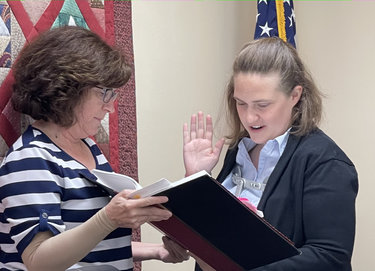Voorheesville wades into pot-shop debate
VOORHEESVILLE — When then-Trustee Rich Straut assumed the village’s mayoralty in July, he said he wanted to bring in someone with fresh ideas as his replacement. “I’d like to bring in some youth,” Straut said at the time.
Enter 30-something Kaitlin Wilson, the daughter of Robert Conway, the longtime Voorheeville mayor whom Straut replaced. Straut is in his 50s; the other three trustees are in their 70s.
That generational divide was on display at the village board meeting this week as Wilson was the only trustee to speak favorably of marijuana retail dispensaries in the village. “You are just basically creating a liquor store,” Wilson said during the Oct. 26 meeting.
The state’s Marijuana Regulation and Taxation Act of 2021 was signed into law in March. It made recreational marijuana use legal for people 21 and older in New York State, while its sale will be permitted once rules are established. But, even in the absence of state regulation on the matter, municipalities were still given only until Dec. 31 to opt out of allowing retail dispensaries or licenses for on-site consumption.
The board of trustees plans to present a local law at its Nov. 10 board workshop, hold a public hearing on the law at the trustees’ regular meeting, currently slated for Nov. 23, and then vote on its adoption at the same meeting.
Locally, public hearings on the issue have been devoid of controversy — and speakers. In Guilderland, four residents spoke on the matter while Altamont’s public hearing saw about the same number of speakers.
The new local law is subject to a permissive referendum, meaning a petition can be submitted to the board requesting the issue be put to the voters in a special election. If no petition is circulated within the 30 days, village attorney Rich Reilly said during Voorheesville’s Oct. 26 meeting, “then it becomes law, meaning on the expiration of 30 days.”
While Wilson spoke favorably of dispensaries, Straut said, “We’re going to have a lot of different thoughts,” before asking Trustee Sarita Winchell for the opposing view.
Winchell preferred a wait-and-see approach.
“I’m more concerned about the fact that, if you don’t act, you can’t make any decision in the future,” Winchell said. “Whereas, I would rather wait.”
Winchell was concerned with what would happen if the municipalities surrounding Voorheesville all opted-out and the village became a destination for marijuana-seekers.
“That would be beneficial for us because we would make a lot of money in sales,” Wilson countered. “We would get a lot of taxes from that.”
Most in the meeting appeared to be under the impression that marijuana would be taxed like a typical retail good, with 4 percent going to the state and 4 percent going to Albany County, and then a portion of that county money being distributed back to the municipalities based on their population, which is not the case.
The new state law imposes a point-of-sale retail tax of 9 percent for the state and 4-percent local tax — 1 percent is retained by the county and 3 percent goes to the municipality, doled out on a quarterly basis.
Straut said he was more concerned about the on-site consumption establishments than he was with the dispensaries.
“People want to buy it, they’re going to buy it,” the mayor said. “But the consumption establishment, who knows what that brings? Is it, you know — what’s the impact to kids in school? Those are questions I have in my head. I don’t know what it brings. It could bring a lot of baggage, potentially.”
To which Wilson responded, “I mean, I’d like to point out you had a bar next to the elementary school,” referring to the former Smith’s Tavern across the street from Voorheesville Elementary.


